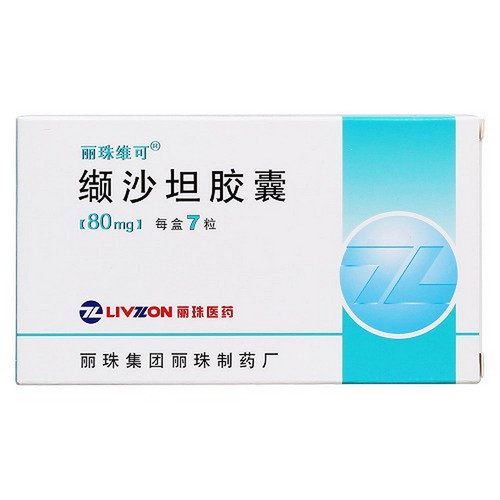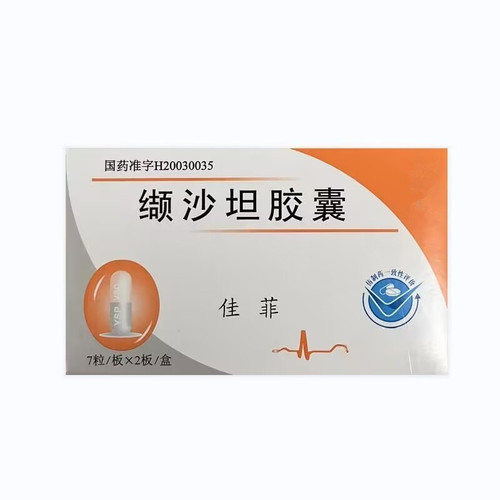Product Overview
[Drug Name]
Generic Name: Valsartan Capsules
Trade Name: TuoWeiKang Valsartan Capsules 80mg*7 capsules
Pinyin Code: TuoWeiKang ZuoShaTanJiaoNang 80mg*7Li
[Main Ingredient]
Main ingredient: Valsartan. Chemical name: (S)-N-Valeryl-N-{[2'-(1H-tetrazol-5-yl)[1,1'-biphenyl]-4-yl]methyl}-valine
[Properties]
This product is a hard capsule containing a white powder.
[Indications/Main Functions]
Valsartan is indicated for all types of mild to moderate hypertension, especially for patients intolerant to ACE inhibitors.
[Precautions]
1. Patients with hyponatremia or hypovolemia: Patients with severe sodium deficiency and/or hypovolemia (e.g., due to high-dose diuretics) may experience symptomatic hypotension when starting valsartan therapy. Therefore, hyponatremia or hypovolemia must be corrected before using this drug. If hypotension occurs, the patient should be placed in the supine position and, if necessary, normal saline should be administered intravenously. Transient hypotension does not preclude further treatment; treatment can be continued once blood pressure stabilizes. 2. Patients with Hepatic Impairment: Approximately 70% of valsartan is eliminated unchanged in the bile. Valsartan undergoes no biotransformation, and therefore its systemic effects are unrelated to impaired liver function. Therefore, no dose adjustment is required in patients with non-biliary or non-cholestatic forms of hepatic insufficiency. However, patients with biliary cirrhosis or biliary obstruction have reduced valsartan clearance (higher AUCs), and caution should be exercised when using valsartan in these patients. 3. Patients with Renal Impairment: Because renal clearance of valsartan accounts for only 30% of total plasma clearance, its systemic effects are unrelated to renal function. No dose adjustment is required in patients with renal impairment. Inhibition of the renin-angiotensin-aldosterone system may alter renal function in sensitive patients. For patients whose renal function depends on the activity of the renin-angiotensin-aldosterone system (such as those with severe congestive heart failure), treatment with angiotensin-converting enzyme inhibitors or angiotensin receptor blockers may result in oliguria and/or progressive azotemia and (rarely) acute renal failure and/or death. Therefore, caution should be exercised in patients with severe renal insufficiency (creatinine clearance 10 ml/min). Short-term use of valsartan in 12 patients with renal hypertension due to unilateral renal artery stenosis did not result in significant changes in renal hemodynamics, serum creatinine, or blood urea nitrogen. Long-term use of valsartan has not been studied in patients with unilateral or bilateral renal artery stenosis. Because drugs that affect the renin-angiotensin-aldosterone system may increase serum creatinine or blood urea nitrogen in patients with unilateral or bilateral renal artery stenosis, these parameters should be carefully monitored for safety reasons. 4. No mutagenic, mitogenic, or carcinogenic effects have been identified. 5. Keep this medication out of the reach of children. 6. Used medication packaging should not be discarded carelessly.
[Drug Interactions]
This drug is contraindicated in patients with known allergies. It is contraindicated in pregnant and lactating women.
[Specifications]
80mg*7 Capsules
[Dosage and Administration]
The recommended dose is 80mg once daily, regardless of gender, age, or race. Antihypertensive effects appear within 2 weeks, reaching maximum effect after 4 weeks. For patients with inadequate blood pressure control, the daily dose can be increased to 160mg or a diuretic can be added. This drug can be used in combination with other antihypertensive agents.
[Adverse Reactions]
Adverse reactions are rare, mild, and transient: 1. Mild headache, dizziness, fatigue, abdominal pain, dry cough, and postural blood pressure changes are rare. 2. Increased serum potassium, neutropenia, decreased hemoglobin and hematocrit, and increased serum creatinine and transaminases have been reported. 3. Adverse reactions such as diarrhea, rhinitis, pharyngitis, arthralgia, and nausea have been reported.
[Contraindications]
This drug is contraindicated in patients with known allergies. It is contraindicated in pregnant and lactating women.







